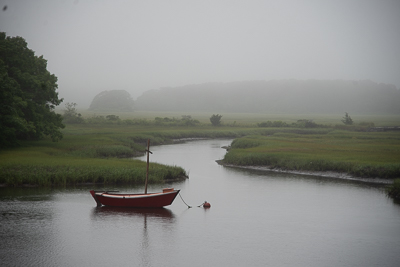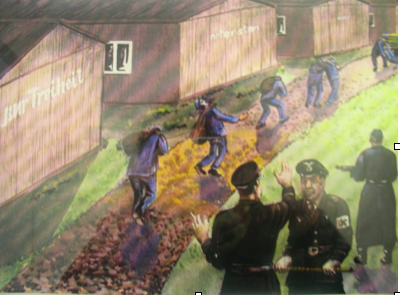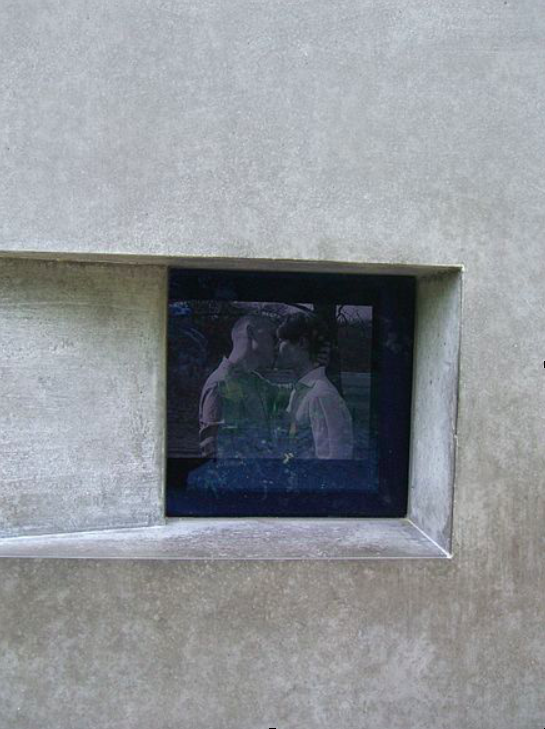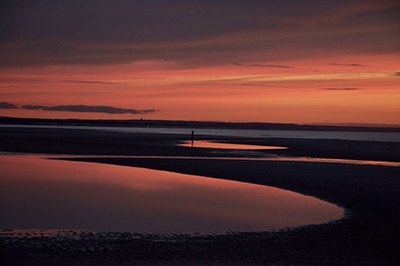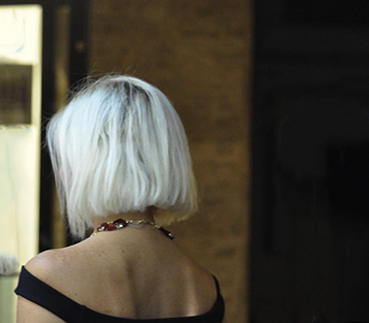 Laura’d been taking birth control pills behind her husband’s back, keeping them hidden in the tampons.
Laura’d been taking birth control pills behind her husband’s back, keeping them hidden in the tampons.
She could not articulate why she did not want a child, smiled apologetically when people asked if she and Wyatt were trying, especially people from the campaign. Wyatt was running for state senate on the Republican ticket and, every night, he pressured her.
“We could inseminate,” he said, flipping channels with the remote, light from the television projecting out in a beam so that everything but him was in darkness, “Put the kid together in a test tube.”
“Like on Jurassic Park?” she asked.
“I was thinking more like Gattaca,” then he changed the channel again.
He might have meant it, he might not, but that didn’t keep Wyatt from continuing to try the old-fashioned way, pounding into Laura like his dick was a hammer and her body a Habitat home. He tracked her ovulation, watching every morning as she prodded the basal body thermometer in her mouth. Each week before her time, she thought about crushing the thing: taking it out to the driveway and tossing it on the pavement, driving back and forth, pummeling it down to smithereens. That’s what she wanted — not some plastic little stick with a gauge on the end giving him a number. Smithereens.
“Maybe we’ll get lucky tonight, huh, babe?” Sex in the morning, sex in the evening, Wyatt coming home early from work for sex, and more sex. If he’d had this much virility their entire marriage, she might not have grown disenchanted, the dopamine it released continuing to mask her need as infatuation and her longing as love.
Each time he approached she said nothing, arms wrapping around her from behind as she tried to go about the most basic of things. Like making cookies, which was what she was doing today when he eased up out of nowhere, Laura not even having heard him come in. “Hi, hotness. Your temperature says it’s time.”
Laura had already mixed in the flour, every turn getting thicker. As her left arm worked the batter, Wyatt slid his hands along her body. She twisted her arm to get a better angle on the bowl, bumping her butt out a micro-degree. He took this as a response, as some triggering deep down in her loins, and moved one hand to her breast, the other below.
“I’m making cookies,” she said.
“You’re baking something alright,” dick growing firm, “Stir harder.”
***
Wyatt had been married once before. That had actually been one reason Laura kept going out with him: In a state that was slim pickings, she knew he had staying power. He was not divorced — rather a widower — and there was something to having never left anyone that Laura admired. And, in the early days, he’d been a fantastic listener. But the deeper Wyatt got into his campaign, the less Laura felt she could voice. The night of this year’s Lincoln-Reagan Dinner, he’d asked she not wear the blue dress he’d always loved seeing her in before. After a fundraising event in Mercer County, “I would prefer you not tell people you’re for gay marriage.”
When Laura said, “Laura Bush is,” Wyatt just shrugged. “W didn’t run in Kentucky.”
No, she thought, he was from Texas which is worse, but that was the night Laura decided not to argue, to choose her battles, knowing there’d be more to fight, like “You’d have to be crazy to trust the government with your healthcare” or “Stop calling the president a racist.”
“But he is racist,” Laura said, and Wyatt just looked away.
Two weeks after the cookie incident, she was not pregnant. “Sorry, baby.”
“Let me see it,” Wyatt reached for the stick. He’d started sitting outside the bathroom while she peed, something Laura had asked him not to do, but he said, “I’m just so excited. I can’t even wait long enough for you to come out and let me know.”
She did not wipe it down first.
“Damn it,” he muttered, then “Laura, what are we going to do?”
Buy stock in First Response, she thought, as many of those things as we buy, but instead she said, “I don’t know. What do you think?”
“I think you should go to a specialist.”
Laura flushed the toilet and washed her hands. “Do we have to discuss this now?” trying to figure out what to say next. Wyatt was sitting on the bed and had laid the stick on the comforter beside him. Great, she thought, now there’s urine on the bedspread.
“If we don’t talk about it now,” he said, “I don’t know when we will. I mean, for Pete’s sake, babe, it’s been a year.”
“I thought for sure that time with the cookies did it.” Laura looked down at the floor as though she were embarrassed by the thought of her own infertility, a barren wasteland of woman ashamed.
“Is there anything you should tell me?” he said, and for a moment she thought he’d found the pills. “Does infertility run in your family? Maybe a riding accident when you were young?”
“A horse. You think riding horses can make a woman infertile.”
He gestured vaguely, muttering, “I don’t know how all that,” pointing toward her stomach, “works.”
“You should,” she said, “You want to legislate it,” then “Not now,” Wyatt sighed.
Abortion was the one issue upon which he never wavered: Morally and ethically, the man was honest to goodness pro-life, sincerely believing each collection of cells was truly alive: a beating heart, a burgeoning mind that needed a woman’s body to grow. She hadn’t even brought it up, hadn’t broached the topic at all, three months into their relationship, then one night between dessert and the check, Wyatt had looked her in the eyes and said she was amazing, that she was the smartest woman he’d met in his life, “But Laura, there’s something I have to know — something I need you to know: I can’t get serious — can’t start thinking marriage — with a woman who’s pro-choice,” and she sat across the table stunned from the abruptness of it all.
Of course he was pro-life. He was an upper-class white man from Anchorage, Kentucky. They all were pro-life come election time, but at the moment this very life began to expand, slipped their mistresses cash, whispering “Be done with it.”
She picked up her purse, ready to storm out in protest, when he opened his wallet and took it out — an ultrasound — and smoothing the wrinkles down, patting each corner, said, “My wife was pregnant when she died,” and what could she say to that.
Laura squeezed her eyelids tight to block the memory, to stop thinking about how the longer they went out, Wyatt talked more and more about how badly he wanted kids. She had known it when they married, had told herself it would not be a problem. Her body, her beliefs and neither was his to approve.
“We need to find out why you can’t get pregnant,” Wyatt calmly said. “I’ll make you an appointment with Charlie Toms.”
Dr Toms was Lexington’s top fertility specialist, helping wives crank out conservative babies one at a time. Dr Toms can go to hell, she thought, then said, “What makes you think it’s me?”
Wyatt stood up and slipped his arm around her, took a firm grip on her waist. “I know you’re not ovulating,” he smiled, “but that doesn’t mean we can’t try,” and as Laura matched her lips to his, pressing slightly, she wondered how long she could pretend. One more hammer to build a home, one more fake orgasm. “Honey, I want a baby. Don’t you?”
“Of course,” she said, then pushed her husband down on the bed.
***
Dr Toms’ office was cold. It wasn’t that the staff was rude or the decor austere; it was physically cold and Laura wrapped her arms across her body, rubbing hands on top of shoulders.
“Don’t be nervous,” Wyatt said. “The doctor’ll probably just give you vitamins or something.”
She loved how he continued to think this was her fault — well, technically it was, but Wyatt didn’t know that. He just assumed they hadn’t conceived because something was wrong with her lady works, that she’d been made defective. Twenty percent of the time infertility was the man and only the man. They don’t make enough swimmers, she had read, their sperm isn’t fertile, something crooked in their penises keeps it from coming out at the right angle. Laura had learned far more about fertility in the week before the appointment than she’d ever wanted to know, searching online with incognito browser, trying to find some scientific excuse she could give Wyatt.
There was a ninety-nine-point nine percent chance that Wyatt would not go into the examining room with her, that he would sit in this cold room reading out of date copies of National Review while smiling at the receptionist, boobs snugged tight in a Monica Lewinsky sweater. She looked remarkably like Wyatt’s first wife. “She was eighteen weeks,” he had said on their date, “car wreck,” fingers brushing the ultrasound, “Don’t tell me she wasn’t a person.” And when Laura saw the way he looked at that picture, how his face, his voice, his body was changing, she thought, there’s something about this man, something that knows how to stay by his commitments, something that knows how to love.
“Laura Walker?” called the nurse.
“It’s alright,” Wyatt said, “You go on back without me.”
***
Dr Toms was a woman — something Laura hadn’t been expecting — and as soon as she came in the room, Laura pointed it out, Dr Toms laughing, “Is that a problem?” in response.
“No, no,” she apologized, saying she was glad, that she preferred female doctors to male because actually she did. The sheer fact that the doctor was a woman made Laura feel free, like she no longer had to concoct some fake medical excuse to not have a child.
Smiling, Dr Toms pushed her glasses up her nose. “It’s the name. My mom thought Charlie would earn me more respect” and, crossing her legs as she sat in the corner, she flipped open Laura’s chart. “So,” she asked, “how long have we been trying?” and Laura blurted, “I’m on the pill.”
“Okay. I’m just taking a shot in the dark here, Laura, but that’s probably why we aren’t getting pregnant.”
“Wyatt — my husband — he wants a child,” and looking at her hands, again felt ashamed.
Dr Toms stepped forward and slowly took Laura’s wrist, wrapping two fingers above and one below, then looked at her watch and counted. “Let’s take your blood pressure. When was your last pap? Regular self-breast checks?” and Laura thought about the time Wyatt saw her pinching her nipples in the shower, thought she was masturbating, and tried to fuck her.
“Yes,” she said, “the first of every month.”
“Do you smoke?,” directing Laura’s feet to the stirrups, “Drink?,” then asking her to lay down, felt Laura’s breasts for lumps. “So why don’t you want children?”
“I — I just don’t,” she said, gown open to the front, always the front, bare.
“Then just tell him,” picking up the speculum and swinging around the light as she squatted on a stool between Laura’s legs.
“It’s not that easy,” feeling the goo, the metal slide in, “I got an abortion in college and he’s pro-life,” and at that Dr Toms stopped, holding the pap swab mid-air.
“That’s not in your chart,” she said, and “Neither is the fact that I’m on the pill,” Laura laughed before realizing she was the only one who got the joke.
“Look,” she said, legs spread, gown open, “I grew up without a dad.”
“I don’t understand.” Dr Toms prodded in the swab. “You’re married. This is not a single-parent household situation.”
“I wasn’t then. And I don’t have to justify myself to you.”
Dr Toms said nothing, simply stirred around the pap.
“It’s a personal decision,” Laura said, cervical spatula moving round and round, removing cells from her body even now as she spoke, “and I wouldn’t have gotten any support from the father — none at all. It would not have been loved. I wouldn’t have loved it, he wouldn’t have loved it, and we all do the best we can at the time. I made the responsible decision,” not even sure now she believed it, thighs falling farther and farther apart. “I did the responsible thing. I went on the pill. I went on the pill so I’d never need another one,” and sliding the metal out, Dr Toms said, “Your husband doesn’t know?”
Laura hated gynecological exams, hated them deep in her soul and as she folded her knees back together, the empty wet oozed between her legs.
“You’ll get your results in a week,” the doctor pulled off her gloves, “and in the meantime, you might want to consider telling your husband the truth.”
In the lobby, though, the only thing Laura could say was “I don’t want to talk about it,” pushing past Wyatt as he asked about a co-pay, ignoring the receptionist who looked like his wife, sitting in the car while Wyatt took forever to work out the bill, then ignoring the question he asked again and again the entire way to Man O War.
“Trust me, sweetheart,” she said at the bypass, “You don’t want to know that much about how all this works,” then looking away, out the car window, whispered, “It can’t be fixed. It would — it would just kill me to have a child.” And the part of her that had wanted love, had wanted to love a man so compassionate that he’d wanted a baby who did not exist, knew Wyatt had lost one life already and would not pressure her to get pregnant again.
Her husband remained silent all the rest of the way to the house, then pulling into the driveway said, “Maybe you should go on the pill.”

